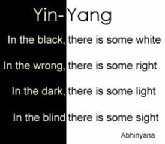


Philosophical musings on Quanta & Qualia; Materialism & Spiritualism; Science & Religion; Pragmatism & Idealism, etc.



 NEXT
NEXT
 BACK
BACK
Glossary Hints :
Glossary terms are indicated in the blog text by the dark blue color : BothAnd
A click on the linked term will take you to the glossary definition.
For more information on technical terms, go to the indicated links, both internal and external






GLOSSARY OF TECHNICAL TERMINOLOGY

BothAnd Blog :
Individuals may have strong beliefs & principles. But interpersonal endeavors require more flexibility. So, this blog is an argument for Relativism, Negotiation, Compromise, & Cooperation.
The usual alternative to these wavering wimpy ways is the unyielding dominant stand-point of Absolutism, Conflict, and Competition. Royal and Imperial political & religious systems tend to adopt an autocratic stance of “my way or the highway”. Whereas, In more democratic and egalitarian systems, the marketplace of ideas will determine truths and values.
Nationalism is a modern pseudo-democratic off-shoot of Royalism, with its divine right to rule a nation of pawns. Democracy and Socialism are imperfect attempts to accommodate the needs & wishes of all citizens from top to bottom.
The Blog assumes that we will always have people on both sides of every issue. Yet, we can still have our private beliefs, even as we make public concessions to necessity.
http://bothandblog5.enformationism.info/- BothAnd Philosophy
Ambigamy :
Like the BothAnd Principle, Ambigamy embraces ambiguity as a natural fact of life to be dealt with rationally and pragmatically.
“Ambigamists embrace the tension between opposites, faith and doubt, romance and skepticism, being partial and impartial, loving and tough, yin and yang. They don't try to reconcile opposites with some middle ground universal solution. . . . .”
https://www.psychologytoday.com/us/blog/ambigamy
BothAnd-ism :
An inclusive philosophical perspective that values both Subjective and Objective information; both Feelings and Facts; both Mysteries and Matters-of-fact; both Animal and Human nature.
It’s a G*D centered view-point rather than an ego-centric, or tribal, or national, or creed-centered standpoint.

Parallel Lines Meet At Infinity
Yin & Yang are contrasting reductive qualities, but they are unified by the all-encom-passing circle of holism.

|
BEING :
In my own theorizing there is one universal principle that subsumes all others, including Consciousness : essential Existence. Among those philosophical musings, I refer to the "unit of existence" with the absolute singular term "BEING" as contrasted with the plurality of contingent "beings" and things and properties. By BEING I mean the ultimate “ground of being”, which is simply the power to exist, and the power to create beings.
Note : Real & Ideal are modes of being. BEING, the power to exist, is the source & cause of Reality and Ideality. BEING is eternal, undivided and static, but once divided into Real/Ideal, it becomes our dynamic Reality. [ see G*D; see BEISM ]
|
|
BEISM :
Since the 17th century religious philosophy of Deism is easy to ridicule because of its apparent pointlessness, I half-seriously propose a new term for the 21st century : BEISM. Like classical Deism, it's a sober rational worldview, that tends to subordinate Emotions to Reasons. But unlike materialistic orthodox objective Science, with its denial of subjective Qualia, BEISM views Existence (something rather than nothing) as the primordial essence, analogous to the Spirit of God.
[ see Deism ; see BEING ]
|
|
Brain/Mind Paradox :
Empirical Science treats the human mind as an integral function of the physical brain. But we intuitively put the mind in a different category. That's why it has traditionally been associated with a non-physical Soul, which requires a dualistic notion of humanity. The Enformationism paradigm though, is ultimately monistic, viewing Information as the single "substance" of reality. But that primordial stuff has two aspects : an active verb form, EnFormAction (energy), and a passive noun form, Information (matter). The brain is enformed stuff, which converts stored Information (memory) into ideas, images, and feelings. [ See Post 34 ]
|
|
Both/And Principle :
My coinage for the holistic principle of Complementarity, as illustrated in the Yin/Yang symbol. Opposing or contrasting concepts are always part of a greater whole. Conflicts between parts can be reconciled or harmonized by putting them into the context of a whole system.
- The Enformationism worldview entails the principles of Complement-arity, Reciprocity & Holism, which are necessary to ofset the negative effects of Fragmentation, Isolation & Reductionism. Analysis into parts is necessary for knowledge of the mechanics of the world, but synthesis of those parts into a whole system is required for the wisdom to integrate the self into the larger system. In a philosophical sense, all opposites in this world (e.g. space/time, good/evil) are ultimately reconciled in Enfernity (eternity & infinity).
- Conceptually, the BothAnd principle is similar to Einstein's theory of Relativity, in that what you see ─ what’s true for you ─ depends on your perspective, and your frame of reference; for example, subjective or objective, religious or scientific, reductive or holistic, pragmatic or romantic, conservative or liberal, earthbound or cosmic. Ultimate or absolute reality (ideality) doesn't change, but your conception of reality does. Opposing views are not right or wrong, but more or less accurate for a particular purpose.
- This principle is also similar to the concept of Superposition in sub-atomic physics. In this ambiguous state a particle has no fixed identity until “observed” by an outside system. For example, in a Quantum Computer, a Qubit has a value of all possible fractions between 1 & 0. Therefore, you could say that it is both 1 and 0.
[ see Fuzzy Logic ]
• Click here for a popup discussing the BothAnd philosophy associated with the Enformationism worldview.
[ see BothAnd Blog at left; see blog post 85 ]
|
BothAnd = Win-Win = Non-zero-sum
The BothAnd Philosophy
Philosophy is the study of ideas & beliefs. Not which are right or wrong – that is the province of Religion and Politics – but which are closer to universal Truth. That unreachable goal can only be approximated by Reason & Consensus, which is the method of Science. In adition to ivory tower theories, applied Philosophy attempts to observe the behavior of wild ideas in their natural habitat.
The BothAnd philosophy is primarily Metaphysical, in that it is concerned with Ontology, Epistemology, & Cosmology. Those categories include abstract & general concepts, such as : G*D, existence, causation, Logic, Mathematics, & Forms. Unlike pragmatic scientific "facts" about the physical world, idealistic Metaphysics is a battle-ground of opinions & emotions.
The BothAnd principle is one of Balance, Symmetry and Proportion. It eschews the absolutist positions of Idealism, in favor of the relative compromises of Pragmatism. It espouses the Practical Wisdom of the Greek philosophers, instead of the Perfect Wisdom of the Hebrew Priests. The BA principle of practical wisdom requires “skin in the game”* to provide real-world feedback, which counter-balances the extremes of Idealism & Realism. That feedback establishes limits to freedom and boundaries to risk-taking. BA is a principle of Character & Virtue, viewed as Phronesis or Pragmatism, instead of Piety or Perfectionism.
The BA philosophy is intended to be based on empirical evidence where possible, but to incorporate reasonable speculation were necessary. As my personal philosophy, the basic principle is fleshed-out in the worldview of Enformationism, which goes out of the Real world only insofar as to establish the universal Ground of Being, and the active principle in Evolution.
Phronesis : an Ancient Greek word for a type of wisdom or intelligence. It is more specifically a type of wisdom relevant to practical action, implying both good judgement and excellence of character and habits, or practical virtue.
* ref : Skin In The Game, by Nassim Nicholas Taleb; researcher in philosophical, mathematical, and (mostly) practical problems with probability.







 NEXT
NEXT
 BACK
BACK







